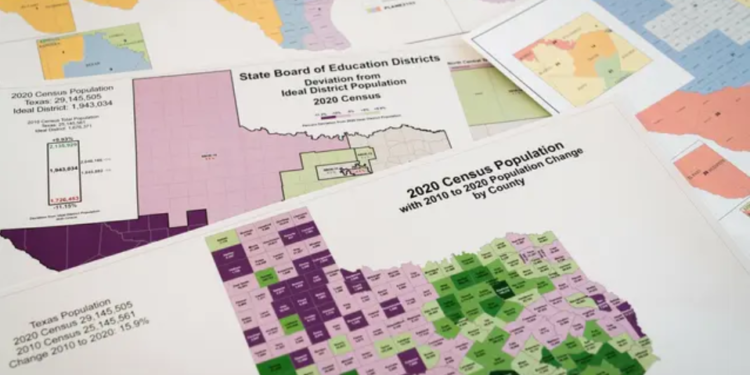May 21, 2025 Story by: Publisher
A significant federal trial began this week in the El Paso Division of the U.S. District Court for the Western District of Texas, aiming to determine whether Texas’s 2021 redistricting maps unlawfully discriminate against Latino and Black voters.
The case, heard by a three-judge panel, scrutinizes congressional and state legislative maps drawn by the Republican-controlled Legislature following the 2020 census. Plaintiffs argue that these maps dilute minority voting power and violate the Voting Rights Act and the U.S. Constitution.
Allegations of Diluted Minority Representation
The plaintiffs, including civil rights organizations such as the League of United Latin American Citizens (LULAC), Eddie Bernice Johnson, Sheila Jackson-Lee, Alexander Green, and Jasmine Crockett. The plaintiffs contend that the redistricting process intentionally minimized the electoral influence of minority communities.
They highlight that despite people of color accounting for 95% of Texas’s population growth over the past decade, the new maps fail to create additional majority-minority districts. Instead, they allege that the maps “crack” minority communities—dividing them among multiple districts—to dilute their voting strength.
According to the 2020 Census, Texas added 4 million residents in the prior decade, gaining two congressional districts. Of this growth, more than half was among the Latino community. Despite this, the state drew 23 white-majority districts out of 38 total congressional districts, while Latino voters made up majorities in only seven. The remaining eight districts had no majority group.
Here are some key national-level 2020 Census results to help you see how your state or county compares in each topic area:
Race and ethnicity (White alone 61.6%; Black alone 12.4%; Hispanic 18.7%; Asian alone 6%; American Indian and Alaska Native alone 1.1%; Native Hawaiian and Other Pacific Islander alone 0.2%; Some Other Race alone 8.4%; Two or More Races 10.2%).
Defense Cites Partisan Considerations
Texas officials defend the maps, asserting they were drawn based on partisan considerations, which the Supreme Court has deemed permissible, and not racial intent. They argue that the redistricting complies with legal requirements and reflects legitimate political objectives.
Broader Implications for Voting Rights
This trial occurs amid a broader national debate over voting rights and redistricting practices. Recent court decisions have impacted the interpretation of the Voting Rights Act, influencing how minority representation is addressed in electoral map drawing. The outcome of this case could have significant implications for future elections in Texas and potentially set precedents affecting redistricting efforts nationwide.
Awaiting Judicial Determination
The court’s decision is anticipated to be delivered in the coming months. Depending on the outcome, Texas may be required to redraw its legislative and congressional maps to ensure compliance with federal laws protecting minority voting rights. The ruling could also influence redistricting practices in other states, particularly those with significant minority populations and histories of voting rights challenges.
In March, The Department of Justice has withdrew from a lawsuit challenging Texas’ legislative and congressional district maps, which were redrawn following the 2020 U.S. census. A case initially brought forth by the League of United Latin American Citizens (LULAC) and supported by Congresswoman Eddie Bernice Johnson, marks a significant shift in the legal landscape surrounding electoral districting in the state. The lawsuit alleged that these maps discriminated against Latino and Black voters by limiting their ability to participate equally in the electoral process.
A DOJ attorney told a panel of judges, shortly before the start of a courtroom trial, that the federal government wanted to dismiss all of its claims against the state’s maps of congressional and state legislative voting districts. The federal government had previously claimed those maps dilute the voting strength of Black and Latino voters.
Source: Texas Tribune

















